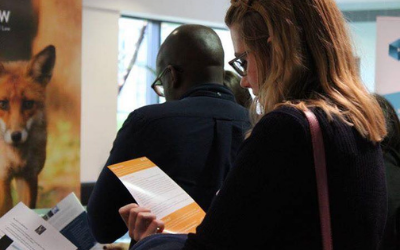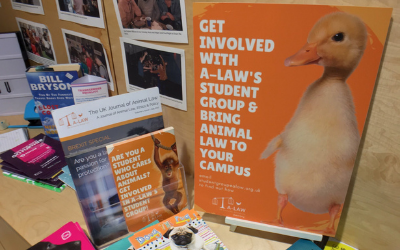Gwendolen Morgan
Gwendolen studied at Trinity College Dublin, completed her LPC at City Law School and trained at Fisher Meredith LLP.

Gwendolen studied at Trinity College Dublin, completed her LPC at City Law School and trained at Fisher Meredith LLP. She currently works at Bindmans LLP in the Public Law and Human Rights department, where a substantial part of her practice deals with animal rights.
Did you always know you wanted to be a lawyer?
I had originally planned to work in overseas development following a law degree. But when I started practicing I got hooked: I found litigation all consuming and loved being able to use the law to help people, animals and the environment. I also find it fascinating to observe how history, philosophy and politics influence our legal system in such a dynamic way.
When did you decide you wanted to practice in Animal Law?
Since I was very young (growing up in the countryside with an abattoir on a nearby farm) I have been interested in animal rights and campaigns around creating more compassionate, sustainable agriculture systems. I have been practicing this area of law for the past five years or so. ‘Animal Law’ is not currently defined as its own practice area because it spans so many areas of law affecting animals, but it is definitely developing as a niche set of services one can offer.
How did you get into Animal Law?
I have always tried to work in areas focused on protecting fundamental rights and tackling social injustice. To me, respect for animals’ welfare seems fundamental to any society which aspires to promote compassion, minimise cruelty and regulate abuses of power by the state or its actors. So Animal Law fitted naturally within my practice.
How much of your practice is Animal Law?
A significant proportion of my practice involves animal rights. Lately, this has involved public law challenges in relation to the proposed licensing of badger culls, wildlife vaccination contracts, Press Complaints Commission and Advertising Standard Agency work and issues relating to beavers, hunting and farm animal welfare.
What is the rest of your practice?
Almost all of my cases fall into the categories of Public Law, Human Rights and Equality Law. Under those broad headings, I do quite a bit of health law, community care, freedom of information and data protection, challenges to cuts to public services, criminal records/CRB challenges, challenges for protesters and victims of forced labour/human trafficking. It is a fairly dynamic practice.
What animal welfare cases are you most proud of?
The Badger Trust challenged the Welsh Government’s decision to cull badgers as part of its strategy to tackle bovine TB. We won in the Court of Appeal on all three grounds. The Government then produced a new Order which Badger Trust again challenged. Fortunately, the Government backed down before we issued. They conducted an independent review of the science and agreed that vaccination alongside cattle-focussed measures was likely to be more effective. So for the moment Welsh badgers are safe and vaccination is working. Unfortunately, the campaign continues across the border in England.
Do you enjoy the work?
I absolutely love it; I feel extremely lucky to work in a job which is constantly stimulating, can actually make a difference and to work on campaigns in which I believe alongside colleagues who are equally passionate.
How can a new lawyer steer their practice towards this area?
What is interesting about the area of animal rights is that it falls into many different categories of law so it really depends on your own areas of interest and where you end up practising. Most areas of law offer the potential to help promote or protect animal rights in some way. You just have to keep an eye out for ways of using the law creatively.
Given that public bodies have the most responsibility over animals, for example in terms of zoo licensing, investigating animal cruelty, regulating industry and making decisions on the environment etc, public law is one of the key areas where one can directly challenge decisions they impact badly on animals.
Human rights is another area which often raises animal welfare issues – eg the Countryside Alliance case, or our challenge for welsh landowners who opposed culling on their land for ethical reasons raised the right to peaceful enjoyment of property and respect for home and private life, or the case of Shambo the bullock (Surayanda v The Welsh Ministers [2007] EWCA Civ 893) in relation to the right to manifest religious beliefs versus public health concerns around bTB.
Environmental, Planning, Forestry and Agricultural Law are clearly very important for animals. EU and International Law can also be very relevant. For example, I am advising Humane Society International on a Bern Convention complaint to the Council of Europe in relation to DEFRA’s badger culling proposals. This involves international environment law. One can also bring complaints under CITES or to the European Commission or to various Ombudsmen. The European Citizens Initiative is another area of EU law ripe for development post-Lisbon. WSPA is campaigning to create a new global UN ‘Universal Declaration on Animal Welfare’, which is a clear gap in the current hotchpotch legal framework.
There are other less obvious areas of law where animal welfare issues arise, such as Crime (eg prosecutions for animal cruelty, defence work in dangerous dogs cases or cases for environmental/animal rights protesters). Employment law may raise issues for people discriminated against for their animal rights principles – eg the Hashman case. In addition, Media Law occasionally involves animal rights issues such as where a complaint is made by or against an animal rights charity about a particular ad, or there is a broadcast which raises controversial issues and a claim ensues.
Contract/commercial issues may also stem from animal rights issues eg animal testing by pharmaceutical companies. Freedom of Information law is also highly relevant here when one wants to gather evidence to support a campaign.
Finally, there is the area of new legislation. The Law Commission is currently consulting on a fundamental review of wildlife law, which all aspiring animal rights lawyers can get involved in to ensure that the protections established are as robust and comprehensive as possible.
The examples above show that it is tricky to define Animal Law but happily one can get involved in promoting animal welfare in lots of different areas of practice. Its breadth makes it all the more fascinating and principles from one area of law can assist in another area in surprising ways.
What tips would you give to students who want to practice in this area?
A lot of the advice would be common to students in any area of law: try and absorb as much knowledge as possible at college and keep abreast of what is happening in the legal press; seize opportunities to apply your knowledge and see how it works in real life, for example volunteer at pro bono clinics, Citizens Advice Bureaux, Law Centres, charities etc or get work experience at a law firm or chambers if you can. Don’t forget that there are really interesting legal careers in local and national government and they certainly need people who have an interest in animal welfare issues.
I found it took time to make sense of the law because at university one learns the theory of different legal areas in hermetically sealed boxes but in real life, as above, problems can raise many different dimensions. Therefore, the sooner you start applying the law and joining the threads together to solve problems, the sooner it will make sense and seem real.
Start meeting people and talking to them about what practice is really like. There are all sorts of special interest lawyer groups like ALAW, Young Legal Aid Lawyers, Friends of the Earth, and Clientearth. You can also get involved in campaign groups and attend meetings. It is a great way of learning the latest on policy/legal developments and it can be motivating to meet lawyers who share your interests and can hopefully act as mentors.
Keeping an open mind is worthwhile. Although clearly it is important when you’re going for jobs to have a strong interest in the firm’s areas of practices, while you are still learning don’t close your mind to other areas or options. Even if you do feel stuck in one practice area, it is worth remembering that with a little determination you can move sideways or cross-qualify at a later stage.
Follow Us !
WE NEED YOUR SUPPORT
We rely upon membership income and donations to carry out our work. Please join us or donate and support our work.
Become a Volunteer! If you like what we’re doing…
why not find out about the different ways you can get involved in our important work?






